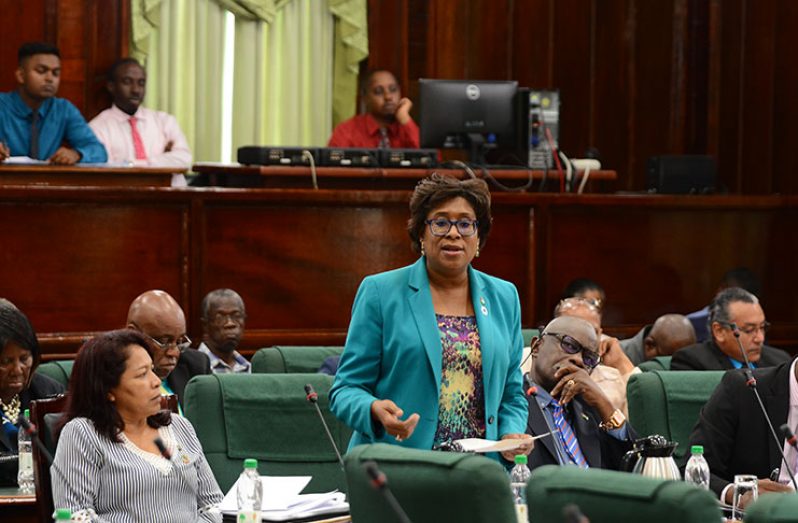CALL Centres in Guyana and other telecommunication companies will soon be able to legally record their staff and clients, once consent is given, now that the Interception of Communications (Amendment) Bill 2019 has been passed in the National Assembly.
The Bill, which is intended to amend the Interception of Communications Act to include five more exceptions, was passed on Wednesday following a statement by the Minister of Public Telecommunications, Catherine Hughes, in the absence of the Parliamentary Opposition.
In defending the Bill, Minister Hughes told the House that Section Three of the Interception of Communication Act makes it criminal for a person to intentionally intercept a communication in the course of its transmission by means of a telecommunications system. A person who commits such an offence is liable on summary conviction to a fine not exceeding five million dollars and imprisonment for a term not exceeding three years.
The Act provides for only two exceptions. Section 3:02 states: “A person does not commit an offence under this section if – (a) the communication is intercepted in obedience to a warrant issued by a Judge under section 6; (and) (b) the communication is not intercepted in obedience to a warrant issued by a judge under section 6 but on the authority of a designated officer in the case of a national emergency or in responding to a case where approval for a warrant is impracticable having regard to the urgency of the case.”
However, the exceptions do not cater to the needs of the expanding Telecommunication Sector, such as call centers. As such, the amendment to the legislation would expand the exceptions to allow for call centers and other telecommunications companies to monitor the quality of their services by recording some of their calls.
“The Bill seeks to provide more exceptions, including, if the person has reasonable grounds for believing that the person to whom or by whom the communication is transmitted consents to the interception, or if the communication is not a private telecommunication etc. These exceptions can be found in most similar legislation across the Region,” Minister Hughes said, while quoting the Explanatory Memorandum at the back of the bill.
Among the five proposed exceptions, one caters for the interceptions done by telephone companies and call centres. For this exception, the “communication is intercepted as an ordinary incident in the course of employment in the provision of telecommunication services.”
This amendment will also provide for the interception of a communication transmitted by a private telecommunication network and is done by a person who has a right to control the operation or use of the network or the express or implied consent of the person whom or by whom the communication is transmitted.
According to Public Telecommunications Minister, the Inception of Communications (Amendment) Bill is a small amendment with a big impact. Due to the current Act, call centres are legally barred from recording the calls between their clients and staff.
“The main reason for such recording as many of us would know, is in the interest of ensuring better quality service to their customers,” Minister Hughes posited.
She said globally, the Call Centre Industry is now a $156B Industry, noting that here in Guyana, the local industry has approximately 5,000 seats with a number of centres established in the country.
“We recognise that to remain viable, we must be able to attract and continue to attract a major international clientele. The passing of this amendment is likely to create a herculean leap in confidence in terms of those potential clients,” Minister Hughes told the House.
It was noted that international operators, who have interest in Guyana, have taken note that the primary Act does not allow for the recording of conversations. Guyana, the Public Telecommunications Minister said, has a unique advantage, and the amendment to the legislation will allow the country to tap into the industry even more. “The call centre business provides employment, not only to young people, but to a range of individuals across ages, across sectors, and therefore as a country, we see this as an industry that can provide much-needed jobs to our citizens of all ages,” Minister Hughes told the House as she submitted the Bill for approval.




.png)









